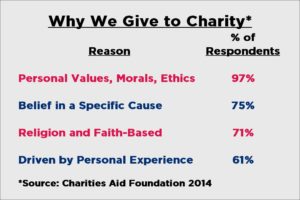Are We Charitable?
Why does anyone give to charity? A survey conducted by a UK organization provides some perspective that likely is relevant in the U.S. as well.
 In a turn of the phrase, “charity begins at home”, U.S. households on average are charitable. According to the Bureau of Labor Statistics, the average U.S. household in 2018 contributed 4% of total income in the forms of cash, goods and services.
In a turn of the phrase, “charity begins at home”, U.S. households on average are charitable. According to the Bureau of Labor Statistics, the average U.S. household in 2018 contributed 4% of total income in the forms of cash, goods and services.
Much charitable giving flows toward year-end, perhaps influenced by holiday spirit but also likely as the closing of a tax year approaches. 2017 tax law changes impacted tax implications from giving. Importantly, a sizable increase in the the standard deduction raised the level at which itemizing charitable deductions may reduce taxes. The benefit is not gone, and certainly neither are the personal reasons to be charitable.
How Can We Give?
A simple way to give a gift is to write a check. To be sure credit is received in the current calendar year, make sure the charity receives the check well before year-end. Today, most charities make giving convenient through online formats that will accept most major credit cards or facilities such as PayPal. Giving online ensures the timely receipt of your gift. Other ways of giving should be considered.
Appreciated Securities – As a result of the strong bull market, many security holdings now have sizable gains relative to purchase cost. An outright sale would trigger taxable income. Such securities can be given to a qualified charity. The donor gets the benefit of a gift recorded at current market value and foregoes any taxes on the gain in value. In turn, the charity receives the gift at the same value with no tax effects. It should be noted as well that one’s estate can benefit from the inclusion of securities with sizable gains.
Qualified Charitable Distributions – A method growing in popularity for those who have reached age 70½ and must take annual Required Minimum Distributions (RMDs”) from their IRAs is Qualified Charitable Distributions (“QCDs”). QCDs can be made to any qualified charity up to an aggregate annual amount of $100,000. Whereas RMDs are treated as taxable income in the year taken, QCDs are not included in taxable income. Whether a QCD is beneficial will depend on individual income circumstances and consideration of the aforementioned standard deduction. While a QCD is not taxable as income, it cannot in turn be taken as an itemized deduction.
Donor-Advised Funds – Most financial services firms offer donor-advised funds. A donation of cash or securities can be made to the fund and a potential tax benefit received in that same year for the whole amount. The fund then can be directed to make gifts to charities of choice on a year-by-year basis for so long as funds are available. In addition, control remains with the donor over fund investments. Individual income circumstances and standard or itemized deduction considerations again come into play. For example, it may be a tax benefit to “bunch” several years of expected future donations into one year through a donor-advised fund and then make actual gifts to charities of choice over several years.
Additional thoughts:
• Start earlier next year and plan for more than one year.
• Consult an authorized tax expert with any questions or uncertainties.
• Remember, while not tax deductible, loved ones can receive a gift of $15,000 each year without a tax impact.
Are you interested in learning more about charitable or other financial planning matters? Let us know and we will be in touch.
